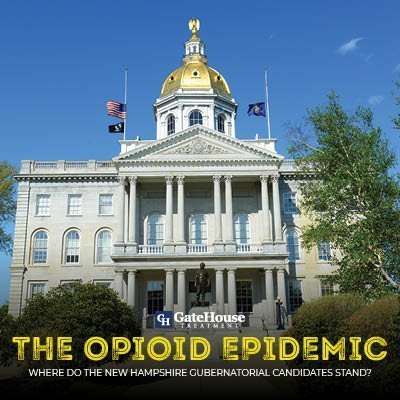
The gubernatorial elections are getting closer, and that means there is a chance for change to come in New Hampshire. Some of the main topics of discussions are where do political candidates stand on addiction, and the opioid epidemic and what are their plans of action when it comes to addiction treatment. In New Hampshire, the state has been hit particularly hard by the opioid epidemic, despite the best efforts made. How can New Hampshire move forward as a state and what are the different approaches of each gubernatorial candidate towards the opioid epidemic.
Molly Kelly
Molly Kelly served as New Hampshire’s Senator for 10 years, during 2006 – 2016. She has a long-standing background with the state of New Hampshire, and has been on the side of addiction treatment for some time now. Kelly authored the bill for the ban of synthetic cannabinoids being sold in New Hampshire, and the law was passed through the Senate.
Kelly stated that “Each town has been trying to deal with this on their own…now there’s a law to help them.” New Hampshire as a whole has been trying to make strides in the addiction crisis and opioid epidemic, but there aren’t many options for help or much addiction and recovery resources available in New Hampshire. Kelly’s plan of action pertaining to the opioid crisis is to:
- Ensure long-term stable funding so that we (New Hampshire) can grow and sustain the network of providers we need to help people get treatment and recovery resources.
- Expand the number of primary care providers with incentives and training to integrate treatment into primary health care.
- Advocate for expanding medication-assisted treatment, including for the federal government to lift the cap on the number of patients that providers can treat with certain medications.
- Continue to expand access to treatment, including medically assisted treatment, within the corrections system.
- Provide greater support for recovery housing and ongoing recovery supportProvide support for children – and their caregivers – who have been impacted by the opioid crisis to help them avoid suffering from substance use disorders and the long-term effects associated with substance use disorders.
Molly Kelly has a history with advocating for substance use disorder treatment and working with the state and the federal government to bring about change when it comes to addiction and the effects it has on the community.
Chrisopher Sununu
Christopher Sununu is serving as New Hampshire’s current governor. He assumed office in January of 2017, Sununu is the youngest governor in the country and has been New Hampshire’s governor since 2016.
The state of New Hampshire received a 45.8 million dollar budget, distributed over 2 years to go toward addiction treatment to aide the state in the midst of the opioid crisis. Currently, New Hampshire has the 3rd highest overdose death rate in the country.
The plan devised for this funding is to open 9, one-stop hubs in existing hospitals and addiction treatment facilities to coordinate client care. The hubs will be 24/7 and will offer assessments, referrals and care coordination. The hubs will be placed strategically around the state so none of the hubs should be more than an hour drive from anyone in the state. Sununu said that the plan is to, “…ensure that all 1.3 million in this state (New Hampshire) have access to care, true access to services, where right now in some areas they are lacking. This is the chance to really get it right.”
Other parts of the plan that for the new budget towards substance abuse treatment are:
- New services for addiction offered through the funding
- Help past the traditional 28 day program that many inpatient rehab facilities offer.
- Services to help with recovery housing, child support and employment.
- Provide long-term framework through this funding, for a new model of substance abuse treatment in New Hampshire
Although the plans still have to be signed off on by federal officials, the program is in place to begin as soon as the approval has been given.
Jilletta Jarvis
Jilletta Jarvis has been campaigning since last year to be New Hampshire’s governor. She has been active on Facebook in her campaign and doing Q&A’s about her campaign and expressing her plan on the major issues that New Hampshire is facing. That includes her plan of action in regards to the opioid crisis and the substance abuse approach that has been taken in New Hampshire in the past.
Jarvis’ plan of action for the opioid crisis includes:
- Legalize marijuana and promote its use in the treatment of those suffering from opioid addiction.
- Invite the lawmakers from Portugal to come and speak with legislation about how Portugal has cut their drug addiction rates in half in 10 years.
- Reform policies and practices to those with proven success, to serve not just those suffering from addiction but all of the communities that have been affected by drugs and drug abuse.
- Push to make drug abuse a health matter, and not a law enforcement matter.
How Does This Effect The Addiction Crisis New Hampshire Faces?
While every candidate has a different plan of action for the state of New Hampshire, it is up to the citizens of the Granite State who their governor will be. Those who have struggled with substance abuse themselves or have loved ones who have fought addiction, know that there are not enough resources for recovery in New Hampshire. The opioid epidemic has already claimed many lives in New Hampshire. The gubernatorial candidates all bring new ideas on how to approach substance abuse treatment could help to improve how addiction is treated in New Hampshire significantly.
- Cymbalta Withdrawal: Causes, Symptoms, And Management - October 12, 2023
- Boredom in Recovery: 5 Tips to Avoid Relapse - October 6, 2023
- Overconfidence and Rehab: Avoiding Relapse - October 4, 2023




